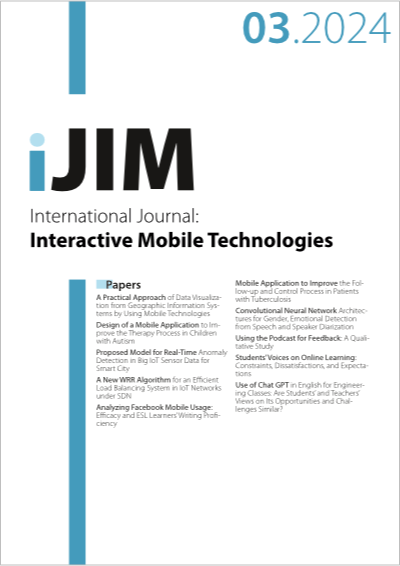Use of Chat GPT in English for Engineering Classes: Are Students’ and Teachers’ Views on Its Opportunities and Challenges Similar?
DOI:
https://doi.org/10.3991/ijim.v18i03.45025Keywords:
Chat GPT, Engineering English, reading, writing and speaking skills, soft skills, tertiary education, AI tools for language learningAbstract
Mobile technologies have become increasingly important in the field of education, providing innovative ways to engage students and enrich their learning experiences. ChatGPT is an innovative tool that can be used in English for Specific Purposes (ESP) classes to engage students, enhance their knowledge and skills, and add variety and interest to the traditional process of learning engineering English, whether accessed through computers or mobile devices. In light of this, the study aims to investigate and compare the attitudes of technical university students and teachers towards using ChatGPT in English classes, as well as their perspectives on academic integrity issues and the strategies they employ when using ChatGPT. The study involved 22 teachers and 60 students from a Ukrainian university. Quantitative research, which involved collecting data through surveys, showed that students exhibited positive attitudes, while teachers took a more neutral approach. Both groups agree that ChatGPT plays a supplementary role in enhancing both hard and soft skills, as well as English language communication skills. However, they emphasized its impact on the development of research skills. The study highlights critical issues related to academic integrity, specifically the differing perceptions of possible violations between students and teachers. The authors present ideas on integrating ChatGPT into ESP classes, enabling teachers to leverage artificial intelligence (AI) tools for language learning and adapt to changing educational landscapes. The study emphasizes the importance of integrating ChatGPT effectively into engineering English classes to support students’ learning. While emphasizing the importance of guidelines for academic integrity, it also advocates for the creative use of AI tools by teachers and students. Addressing the disparity in attitudes suggests providing teacher professional development to ensure proficient use of AI tools.
Downloads
Published
How to Cite
Issue
Section
License
Copyright (c) 2023 Oksana Synekop, Iryna Lytovchenko, Yuliana Lavrysh, Valentyna Lukianenko

This work is licensed under a Creative Commons Attribution 4.0 International License.


